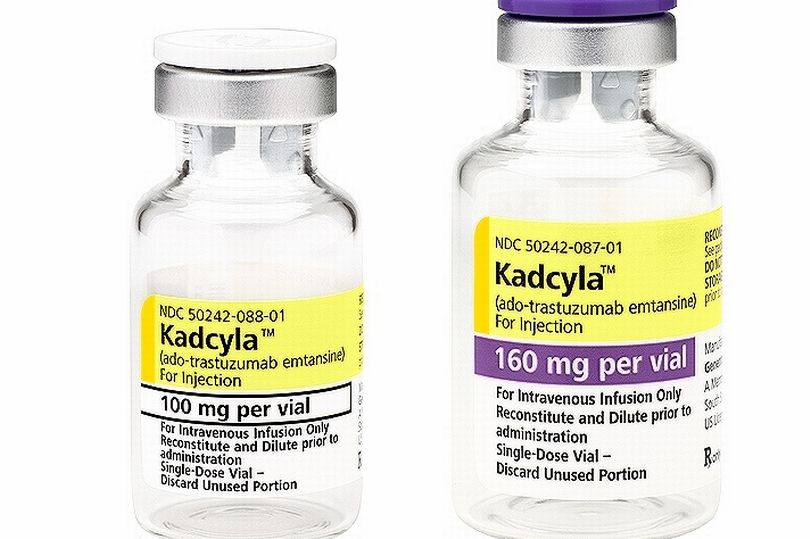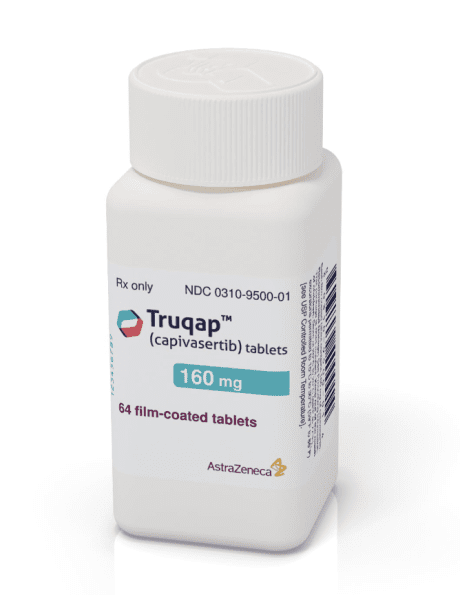Kadcyla (trastuzumab emtansine) vs Truqap (capivasertib)
Kadcyla (trastuzumab emtansine) vs Truqap (capivasertib)
Kadcyla (trastuzumab emtansine) is an antibody-drug conjugate specifically designed for the treatment of HER2-positive breast cancer, combining the HER2-targeting properties of trastuzumab with the cytotoxic agent emtansine. Truqap (capivasertib) is an investigational small molecule inhibitor of the AKT family of kinases, which is involved in the growth and survival of cancer cells, and it is being studied for use in various cancers, including breast cancer. When deciding between these two medications, a patient should consider factors such as the specific type of cancer, HER2 status, previous treatments, and the specific mechanism of action, as Kadcyla is typically used for HER2-positive tumors, while capivasertib's use would depend on the presence of AKT pathway alterations and ongoing clinical trial results.
Difference between Kadcyla and Truqap
| Metric | Kadcyla (trastuzumab emtansine) | Truqap (capivasertib) |
|---|---|---|
| Generic name | Trastuzumab emtansine | Capivasertib |
| Indications | HER2-positive breast cancer | Advanced solid tumors with AKT genetic mutations (investigational) |
| Mechanism of action | Antibody-drug conjugate targeting HER2 receptors and delivering cytotoxic agent | AKT protein kinase inhibitor |
| Brand names | Kadcyla | Truqap (investigational, not yet a brand name) |
| Administrative route | Injection (IV) | Oral |
| Side effects | Fatigue, nausea, musculoskeletal pain, hemorrhage, hepatotoxicity | Hyperglycemia, rash, diarrhea, fatigue |
| Contraindications | Patients with hypersensitivity to trastuzumab emtansine or any of its components | Not fully established; may include hypersensitivity to capivasertib or its components |
| Drug class | Antibody-drug conjugate | Protein kinase inhibitor |
| Manufacturer | Genentech (Roche) | AstraZeneca |
Efficacy
Efficacy of Kadcyla (Trastuzumab Emtansine) in Breast Cancer
Kadcyla (trastuzumab emtansine) is a targeted therapy drug used for the treatment of HER2-positive breast cancer. This medication is specifically designed for patients who have previously received trastuzumab and a taxane, separately or in combination. Kadcyla combines the HER2 targeting properties of trastuzumab with the chemotherapy agent DM1 (emtansine), allowing for direct delivery of the chemotherapy to the cancer cells. Clinical trials have demonstrated that Kadcyla significantly improves progression-free survival and overall survival in patients with HER2-positive metastatic breast cancer compared to the standard treatments. It is particularly effective in treating patients with residual invasive disease after neoadjuvant therapy.
One of the pivotal studies supporting the efficacy of Kadcyla was the EMILIA trial, which showed that patients treated with Kadcyla had a median progression-free survival of 9.6 months compared to 6.4 months in patients treated with lapatinib plus capecitabine. Overall survival was also improved, with a median of 30.9 months for Kadcyla compared to 25.1 months for the control group. These results highlight Kadcyla's role in providing a significant survival benefit for patients with advanced HER2-positive breast cancer.
Efficacy of Capivasertib (AZD5363) in Breast Cancer
Capivasertib, also known as AZD5363, is an investigational oral small molecule inhibitor of the serine/threonine protein kinase AKT. It is currently being studied in various phases of clinical trials for the treatment of breast cancer, among other types of cancer. In breast cancer, capivasertib is being evaluated for its efficacy in combination with other drugs, such as fulvestrant or paclitaxel, and is primarily focused on patients with tumors that have alterations in the PIK3CA/AKT/PTEN pathway, which is a common occurrence in breast cancer.
Initial results from clinical trials have shown that capivasertib, when used in combination with fulvestrant, improves progression-free survival in patients with hormone receptor-positive, HER2-negative advanced breast cancer that is resistant to an aromatase inhibitor. The addition of capivasertib to paclitaxel has also demonstrated an increase in progression-free survival in patients with triple-negative breast cancer, particularly in those with alterations in the PIK3CA/AKT/PTEN pathway. Although capivasertib is not yet approved for clinical use, these promising results suggest that it may become an important therapeutic option for patients with specific subtypes of breast cancer.
Regulatory Agency Approvals
Kadcyla
-
European Medical Agency (EMA), European Union

-
Food and Drug Administration (FDA), USA

-
Health Canada

-
Therapeutic Goods Administration (TGA), Australia

-
Medsafe (NZ)

Truqap
-
Food and Drug Administration (FDA), USA

Access Kadcyla or Truqap today
If Kadcyla or Truqap are not approved or available in your country (e.g. due to supply issues), you can access them via Everyone.org.
How it works

Make an enquiry
Choose the medicine you want to buy, answer a couple of questions, and upload your prescription to speed things up. We’ll get back to you within 24 hours.


Make an enquiry
Choose the medicine you want to buy, answer a couple of questions, and upload your prescription to speed things up. We’ll get back to you within 24 hours.


Breeze through the paperwork
We'll guide you through the required documents for importing unapproved medicine, ensuring you have all the necessary information.


Get a personalized quote
We’ll prepare a quote for you, including medicine costs and any shipping, administrative, or import fees that may apply.


Receive your medicine
Accept the quote and we’ll handle the rest - sourcing and safely delivering your medicine.

Some text on this page has been automatically generated. Speak to your physician before you start a new treatment or medication.
Let's talk
If you have any questions, call us or send us a message through WhatsApp or email:
Contact us




